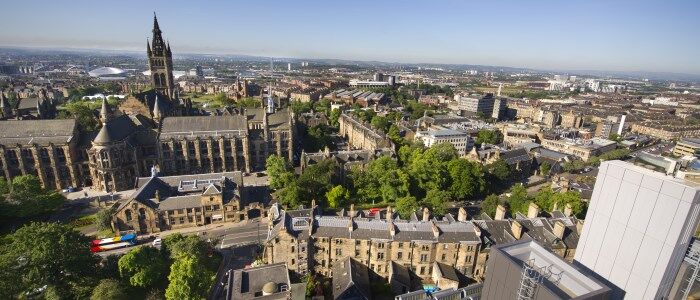The University of Glasgow contributes more than £4 billion to the UK economy, according to a new study into its economic impact.


The World Changing Glasgow: Our Economic Impactreport also found that the University’s influence was growing – its total contribution being up 14 percent on the previous three years.
As well as estimating UofG’s total economic impact on the UK economy to be £4.4 billion, a breakdown of its activities showed:
- research stood at £1.8 billion, 42 percent of the total.
- operating and capital expenditures equalled £1.2 billion (27%).
- teaching and learning accounted for £734 million (17%).
- the remaining 14% (£631 million) was associated with the University’s educational exports.
London Economics, which carried out independent analysis of data from 2018/19, also found that for every £1million it spends, a further £5.8million is generated elsewhere in the UK economy.
The findings come just months after UofG cemented its position as one of the World’s leading universities: positioned 73rd in the global QS rankings; 86th in the Times Higher Education World University Rankings; and named the Times and Sunday Times 2001 Scottish University of the year.
Professor Sir Anton Muscatelli, Principal and Vice-Chancellor of the University of Glasgow said: “This report is significant in demonstrating the broader economic contribution and value of the University of Glasgow’s research, teaching and collaborations with industry in the city, Scotland and the rest of the UK.
“Universities in and of themselves are drivers of economic development. This report illustrates we are not only providing the innovative solutions and excellent research needed to tackle the challenges facing society, but we’re also key facilitators of Scotland’s economic and social recovery, productivity and inclusive growth.
“As a major anchor institution, the University of Glasgow is rooted locally in our community and plays a key role in the economic, cultural, environmental and social wellbeing of our city. This report also describes our extensive global reach and our world-changing potential. With our diverse international student population, our global partnerships and our research excellence: Glasgow’s economic footprint stretches far and wide.
“This report shows that Glasgow is very much at the forefront of several key sectors for the economy- from life sciences and Precision Medicine to quantum technology, 5G and digital innovations. We believe this report indicates how our University can continue to create jobs, drive innovation and growth, and ultimately stimulate Scotland’s recovery now and into the future.”
Cabinet Secretary for Finance and Economy Kate Forbes said: “This report lays out in great detail the tremendous economic and cultural significance of the University of Glasgow, in Glasgow itself, in the West of Scotland, nationally and indeed internationally.
“For almost 600 years the University of Glasgow has been a beacon of research and learning and its role today, in education; and its positive economic impact are as important as they ever were in helping Glasgow flourish.”
Founded in 1451, the University of Glasgow is the fourth oldest university in the English-speaking world and was established for the benefit of the city and its people.
World Changing Glasgow: Our Economic Impact showed that the University, its staff and students, continues to help shape the economic social and cultural prosperity of the city and Scotland. It found:
- the University employs over 8,000 people, making it one of the Glasgow City Region’s largest employers, providing 1% of all jobs within the region and 12% of all jobs within its education sector.
- 82% of its staff live within the Glasgow City Region, spending their wages locally and supporting demand for goods and services.
- 84% of its UK students are from Scotland and 54% of its Scottish undergraduate students are from the Glasgow City Region, with students attending from more than 140 different countries.
- its international student population has more than doubled in the past ten years.
The report also highlighted that the University’s expenditure helps to deliver social, as well as economic, benefits. As part of the first completed building of its Campus Development, the James McCune Smith Learning Hub, it developed a social value strategy with its delivery partner.
This has resulted in the creation of new jobs and training opportunities, helped those furthest from the jobs market into employment, and supported local SMEs and social enterprises to bid for contracts.







































